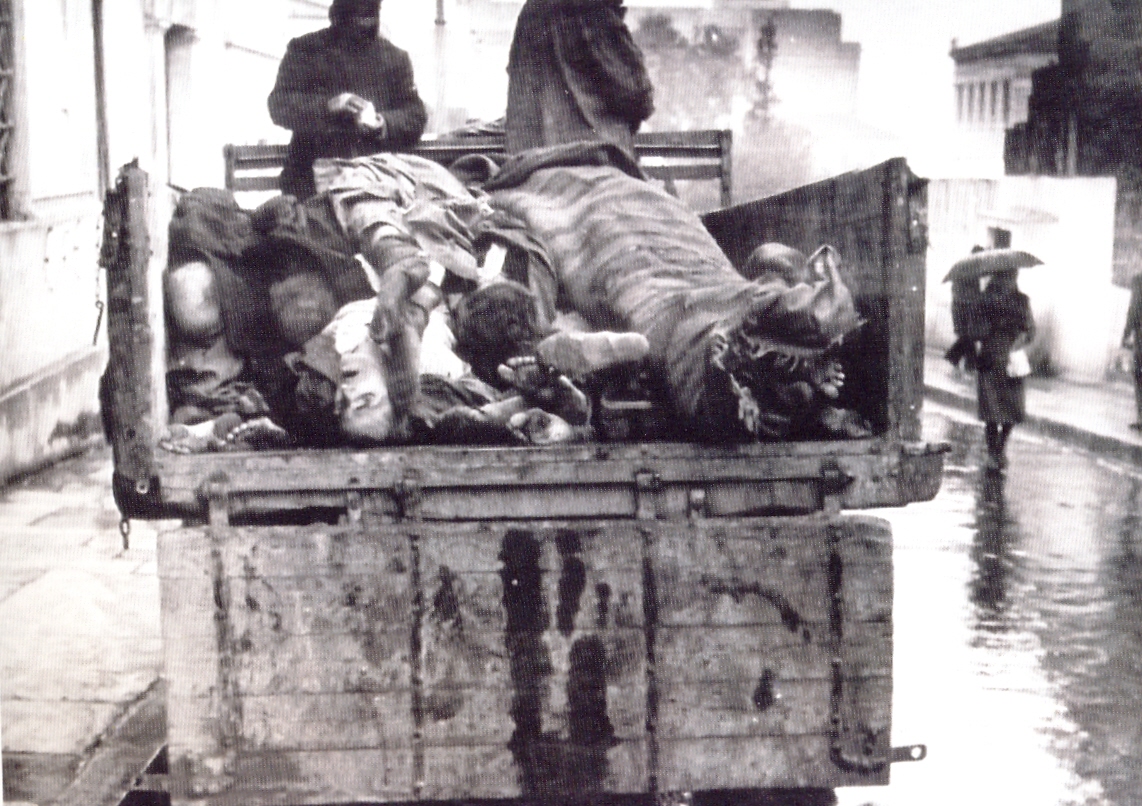In June I attended my children's elementary school end-of-the-year feast, a pleasant event with plays, dances and songs, along with displays of the kids' projects and art. Among the exhibitions was one of (selected?) drawings and images, from all grades. The pictures included, apart from the usual children's themes, a not-really-unexpected dose of social and political subjects: the crisis affects and often devastates all families and children are exposed to the worries and discussions of their kin. Most were implicitly political but a few were overtly so. Among them was this:
At the top the drawing reads "Greece will be saved if we could just kill Merkel". Underneath, intended as a title probably: "The Godmother". Angela Merkel's picture (from a magazine obviously) has horns and a Hitleresque mustache, and there is a speech bubble filled with Euro signs. The legend below the image reads: "Merkel revealed ("under the light") [to be] Hitler's granddaughter". It shocked no-one.
This is not something that is significantly divergent from the general zeitgeist concerning the German government in Greece: my 9 year old son informed me one day, that 'Merkel' is used as an insult in his football practice.Which sort of ties in with the fact that last April Angela Merkel's negative ratings in Greece were at 87% (vs 11% positive) up from 64% and 25% respectively, in March 2010.
A wide majority of Greeks has been disenchanted with Germany. Last year Germany's unfavorable rating in Greece was (uniquely in the EU) at 78% negative. But the disenchantment is broader: The latest poll numbers are dismal regarding what used to be a solid backing for the European project:
(blue = positive, red = negative opinion, left slide regarding the EU, right, the Euro)
This is not something that is significantly divergent from the general zeitgeist concerning the German government in Greece: my 9 year old son informed me one day, that 'Merkel' is used as an insult in his football practice.Which sort of ties in with the fact that last April Angela Merkel's negative ratings in Greece were at 87% (vs 11% positive) up from 64% and 25% respectively, in March 2010.
A wide majority of Greeks has been disenchanted with Germany. Last year Germany's unfavorable rating in Greece was (uniquely in the EU) at 78% negative. But the disenchantment is broader: The latest poll numbers are dismal regarding what used to be a solid backing for the European project:
(blue = positive, red = negative opinion, left slide regarding the EU, right, the Euro)
The general trend has been similar:
[via]
So when starvation rears its ugly head again, this time as well under "German orders", the fact that there is anti-German sentiment in the streets is hardly a surprise. It is indeed surprising that it has not gone overboard yet... Merkel's recent triumph is seen by many in Greece as a popular affirmation of homicidal policies. But of course this is short-sighted: In fact it is a test for the generalized dismantling of the whole European Social contract, which the Dutch King officially announced a few weeks ago...
[I wrote a first quick commentary on the Nazi murder over at the European Tribune. A more complete account is pending - which I will post here as well]
[via]
The remembrance of past evils
The reality of being a debt colony, in which Merkel's "reforms" are a vehicle for large scale societal destruction, is not conducive to creating an atmosphere of cooperation and unity in the EU. The historical burden of a murderous Nazi occupation adds to the mix the aura of deja-vu. The misunderstanding regarding Merkel and her government being called Nazis in the popular / populist press, derives from this. In Greece the Nazis are first and foremost associated in popular memory (indeed living memory, still) not firstly with the Holocaust, but with famine: The last famine in Europe, created by the occupation, which killed perhaps 300.000 out of a total population of 7 million people. My mother in law remembers her grandmother starving to death to give her meager portions of food to her grandchildren and then being thrown into a cart (like the one pictured below) to be buried with nameless others into mass graves. (The irony of a Nazi party rising up in this context is biting...)So when starvation rears its ugly head again, this time as well under "German orders", the fact that there is anti-German sentiment in the streets is hardly a surprise. It is indeed surprising that it has not gone overboard yet... Merkel's recent triumph is seen by many in Greece as a popular affirmation of homicidal policies. But of course this is short-sighted: In fact it is a test for the generalized dismantling of the whole European Social contract, which the Dutch King officially announced a few weeks ago...
[I wrote a first quick commentary on the Nazi murder over at the European Tribune. A more complete account is pending - which I will post here as well]


